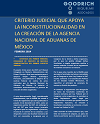-

Goodrich´s Blue Book Mexico
5th EditionAs recognized by numerous investment and trade organizations, for over 20 years the “BLUE BOOK” has proven to be useful for the senior management of corporations when analyzing the Mexican legal framework from a business decision-taking standpoint. -
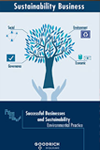
Sustainability Business - Successful Businesses and Sustainability – Environmental Practice
Published on: May 21, 2018The General Law on Ecological Equilibrium and Environmental Protection, among others, addresses a broad range of environmental matters, including water, air and ground pollution, resource conservation, and environmental enforcement, for this reason we recognize the importance of providing specialized guidance to our clients in complex environmental issues, including litigation advisory and support on transactional structures such as legal due diligence on M&A and entailing environmental risk associated transactions. Also, we can provide high quality solutions for oil and gas, real state, mining, pharmaceutical and manufacturing companies in all actions related to air emissions, land use, environmental impact and risk assessment, water exploitation, wastewater discharge, hazardous and special handling wastes. -

Mint - the legal challenges of working and investing in emerging economies
1st EditionGlobal demographics are changing. Over the next 15 years, the global middle class is set to double with three billion people entering its ranks. Many of these new consumers will come from emerging markets. As the balance of global trade shifts away from G8 economies, businesses and investors are increasingly looking to diversify into emerging markets. For that, this report tries to raise the legal challenges of working and investing in emerging economies. -
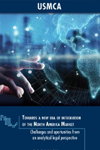
USMCA - Towards a new era of integration of the North America market - Challenges and oportunities from an analytical legal perspective
Published on: 2020By means of a cross-practice exercise, the document contrasts the contents of USMCA with those of NAFTA and other current regimes of commerce and investment worldwide. We further discuss practical ways to minimize risks and make the most out of the treaty. -
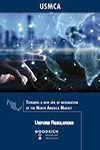
USMCA - Uniform Regulations
Published on: 2020Uniform regulations referred to in Article 5.16 of the agreement between Mexico, the United States of America and Canada, known by its english acronym as USMCA. -
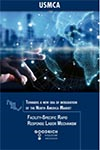
USMCA - Facility Specific Rapid Response Labor Mechanism
Published on: 2020The Facility-Specific Rapid Response Labor Mechanism is to exclusively solve labor controversies in any Priority Sector, which must be related to denial of rights in matters of freedom of association and collective bargaining. -

Energy Disputes
Published on: 2019The recent years have seen sharp rises and falls in crude oil prices, continued rolling-back of regulations and a host of shifts in global politics and international agreements that stand to have a dramatic effect on the industry. The landscape ahead appears ripe for energy disputes and increased risk, as well as opportunity, for companies in every sector of the industry. This global publication from the “Getting the Deal Through” series, aims to provide an overall insight on the relevant legal framework in multiple jurisdictions. -
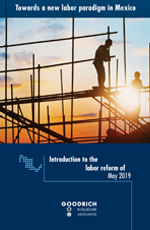
Towards A New Labor Paradigm In Mexico
1st EditionAutor: Goodrich RiquelmeIn the context of the renegotiations of NAFTA, both, the Peña and the López-Obrador administrations worked towards a comprehensive amendment of the country’s labor regime, pursuant to international standards, including those of the ILO’s Convention 98. The promulgation of the new Federal Labor Law is paramount to all economic sectors. The dynamics of Mexico’s union system, as well as the way in which collective bargaining agreements are negotiated and recorded, together with the formation of new labor tribunals will necessarily affect the way in which all commercial players plan their human resources policies. -
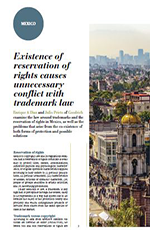
Existence of reservation of rights causes unnecessary conflict with trademark law
Enrique a Diaz and Julio Prieto of Goodrich examine the law around trademarks and the reservation of rights in Mexico, as well as the problems that arise from the co-existence of both forms of protection and possible solutions. -
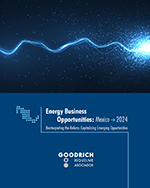
Energy Business Oportunities: Mexico 2024
Published on: February, 2020Upon a research conducted by our Energy Group, the document offers guidance on several energy business opportunities detected across the value chain. This piece of research argues that the market ecosystem created as a result of the 2013 Energy Reform is both, sophisticated and diverse. Handsome opportunities emerge from such interaction among industry players. -
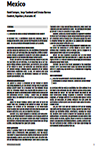
Energy Disputes: Mexico
Published on: 2020Our Energy practice contributed in the 2020 edition of Lexology Getting the Deal Through-Energy Disputes-Chapter Mexico, document in which a current overview of the Mexican energy sector is provided by analyzing topics related to the development of the country’s energy areas, contract enforcement, liability, and investment protection, among others. The document can also be consulted in Lexology’s web page. -
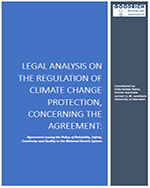
Legal analysis on the regulation of Climate Change Protection concerning SENER’s new reliability policy for the National Electric System
Published on: 2020Little has been said about the violations to the International Climate Change Regime that SENER's Policy could trigger. Our Energy Practice Group, in collaboration with Erika Roldán (former associate and current LL.M. candidate - University of Aberdeen), present a legal analysis of the international Climate Change Regime, as well as their main objectives and States obligations. Besides, a thorough analysis of Mexico's commitments under this international regime is being carried out, and a study of how the enforcement of SENER's Policy would violate Mexico's international commitments. The above, to determine whether there are available legal mechanisms that could be put in place under the International Climate Change Regime. -
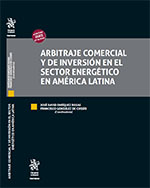
Arbitraje comercial y de inversión en el sector energético en América Latina
Published on: 2020As in any other economic area, international arbitration -commercial and investment- is a resonance box within every evolutionary market. In the case of the energy sector (hydrocarbon + electricity), given its high technicity and regulated regime, as well as the fact that it is capital-intensive, more than 40% of the investment arbitrations under the International Centre for Settlement of Investment Disputes (ICSID) of the World Bank involve energy and infrastructure. A similar percentage exists in commercial arbitration under the auspice of the International Chamber of Commerce (ICC)—both leading institutions in the field. To the importance of investment arbitration in the energy industry, the already relevant, and still growing involvement of Latin America, must be added. All of the above speak to the pertinence of this book.The book has nine chapters that are divided in two general parts: the industrial context and themed perspectives. Throughout its pages, the reader —whether lawyer, arbitrator, investor or student— can find some of the most profound —but practical— insights of the world of arbitration within the energy sector. The scope of the text ranges from economical topics to institutional design, dispute resolution preventive methods, arbitration, best practices, force majeure, regulatory expropriation, interim measures and multi-party arbitration. It is an invitation to the discernment of the most current subjects of arbitration within the energy sector, penned by some of the best writers of the region. -
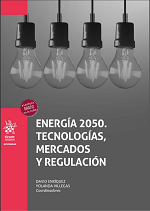
Energía 2050. Tecnologías, mercados y regulación
Published on: 2022Technology has shaped the destiny of humankind, and certainly, the energy sector is no exception to this reality. In this context, climate change mitigation is subject to disruptive innovation, adequate financing and the efficient and large-scale implementation of sustainable energy technologies. However, no matter how successful these may be, their implementation is insufficient if a flexible structuring of international markets and dynamic and standardized regulatory regimes do not back them.Under these challenging premises, some of the best specialists in Ibero-America were asked: what is needed in the area of technologies, markets, and regulation to achieve the global goal of neutrality of carbon and other greenhouse gases by 2050?The dialogue proposed by the book goes through the current status and future projections on generation, storage and transmission technologies in fields as diverse as hydrogen, ammonium and ocean energies. This, without neglecting more consolidated segments of the energy mix, such as photovoltaic and wind sources, as well as transition areas highly demanded today, such as liquefied natural gas, CO2 capture and storage, the role of the consumer / electric generation in distributed systems, the water needs of the sector, as well as digital inclusion and optimization are also tasks, in which our authors delve into. The complex path towards 2050 and the solid geopolitical changes of today make this work a necessary reference for the reflection of public policymakers and civil society in general. -
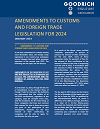
Skip to content
Esta web utiliza cookies propias y de terceros para conocer cómo navegan e interactúan los usuarios, incluyendo analíticas. El consentimiento para su instalación se entenderá otorgado mediante la aceptación o la interacción sobre la página. Para más información: https://www.goodrichriquelme.com/es/cookies/
This website uses its own and third-party cookies to know how users navigate and interact, including analytics. The consent for its installation will be understood as granted by acceptance or by interaction on the website. For more information: https://www.goodrichriquelme.com/cookies/

